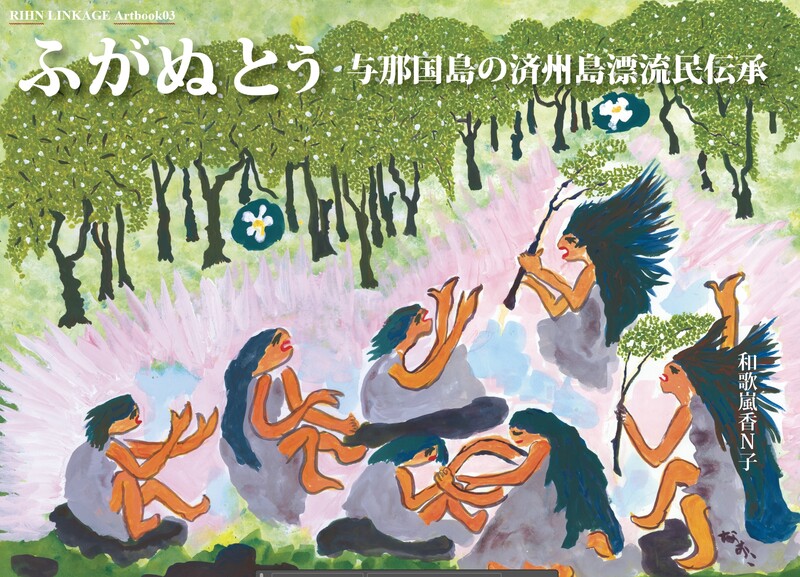![]()
(#RIHN #LINKAGE Seminar) #Drifters to #Yonaguni Island: The Shock Wave of the Encounter with Drifters from #Jeju Island in 1477 @ #Ishigaki Island, #Yonaguni Island, and #Iriomote Island
2025/03/09
RIHN LINKAGE Seminar
The Memory of the People is Revived Now: The Islanders Themselves Visualize the Tradition
2025
09 Mar (Sun) 15:00-17:30 Ishigaki City Health and Welfare Center
12 Mar (Wed) 18:00-20:30 Didi Yonaguni Koryukan
16 Mar (Sun) 15:00-17:30 Funaura Tokimeki Hall in Iriomote Island
Contact: 603-8047
457-4 Kamigamo Motoyama, Kita-ku, Kyoto-shi, Kyoto
Institute for Global Environmental Strategies, LINKAGE Project
Profile
Introduction of N-ko, Waka Ranko, the author
The author was born in Sonai, Yonaguni Island, in March 1954. From a young age, she was taught the wisdom of traditional life and the local language by the elderly, and after graduating from Yaeyama High School, she trained in Kyoto and other parts of Japan before returning to the island and establishing the Nantamura dyeing and weaving studio, which makes use of natural materials. In 2012, she moved to Hokkaido. She creates a variety of art from her daily life, facing the “life” that resides in everything around her and offering her prayers with all her heart.
Lecturers:
CHUN Kyung-soo
Professor Emeritus at Seoul National University, specializing in cultural anthropology. Doctor of Philosophy. His mother's side of the family is from Jeju Island. He visited Yaeyama in 2009 and held a chessa ceremony of thanks and remembrance.
ANKEI Takako
Institute for Biological and Cultural Diversity. Specializing in ecology. Doctor of Science. She and her husband studied in Yaeyama and tropical Africa, and now run a family farm in northern Yamaguchi City.
ANKEI Yuji
Professor Emeritus at Yamaguchi Prefectural University. Specializes in anthropology. PhD in science from Kyoto University. Known as “Bakase” on Iriomote Island, and co-authored “The Annoyance of Being Investigated” with Tsuneichi Miyamoto. Edited “The Cultural Power of Iriomote Island” by Kinsei Ishigaki (Nanzansha).
I can picture ANKEI Takako and ANKEI Yuji talking on the phone for hours with Mr. N. I've also seen the pictures he drew, which look like ancient rock paintings. It was the process of the birth of a myth. The story of the exchange of hearts and languages between the people of Yonaguni Island and Jeju Island over 540 years ago was the “Fuganutu” myth, created through the exchange of hearts and languages between WAKA Ranko, ANKEI Takako and ANKEI Yuji.
This is the only case study that proves the process of the birth of a myth on the earth where human beings have lived. Now, Jeju Island and Yonaguni Island have become a mythological community in the East Asian sea area. The fact that I was able to see the process of the completion of this myth is itself an infinite inspiration and glory for me. CHUN Kyung-soo
In February 1477, people from Jeju Island in Korea drifted ashore on Yonaguni Island, and after being escorted back to their home island over a period of two years, they returned home. The people of Yonaguni Island, who spent six months with the three castaways from Jeju Island, passed on the story of their experiences in great detail. This is a miraculous collection of pictures and writings about the days of cross-cultural exchange and learning with the people known as “Fuganutu” (strangers). The wisdom of the people of the southern islands, where coral grows, who have used the limited natural resources of the islands sustainably. This folklore, which eloquently describes how these things came to be, is a guide for the future of the people of the earth, who live in an age of climate change and war.
Program
Doors open 30 minutes before the start of the seminar. Each part lasts around 30-40 minutes, with a 30-minute Q&A session.
The Jeju Islanders' Drifting Account in the Annals of the Joseon Dynasty (ANKEI Yuji)
An introduction to the detailed account of the 1479 Jeju islanders who drifted to Yaeyama in the official records of the Joseon Dynasty.
Encounter with the Fuganutu tradition of Yonaguni Island (ANKEI Takako)
The thoughts of the elderly who wanted to entrust all the traditions to just one child, and those traditions are comparable to the Memory of the World.
Life in Joseon and Jeju Island in the second half of the 15th century (JEON Gyeong-soo)
The history and culture of Jeju Island, the only place in the Korean Peninsula where oranges grow. Life in Yaeyama as seen from Jeju Island, South Korea.



